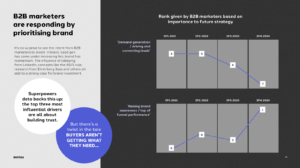For years, B2B SaaS & tech marketing have been hyper-focused on performance-driven, short-term tactics—demand gen, gated content, retargeting, and attribution models. However, recent research indicates a major shift in B2B: brand building is no longer optional; it’s now a critical factor for marketers who need to drive long-term growth and influence buying committees’ purchasing decisions.
Why Brand Building Matters More Than Ever in B2B
Studies show that B2B purchasing behaviors–and B2B buyers, themselves–have changed. They now behave more like B2C consumers, relying on emotion, trust, and consistency when considering a purchase rather than merely logic and data.
Here’s what the research reveals:
- Brand awareness and perception are now key factors in purchase decisions (Dentsu).
- B2B buyers are showing less interest in transactional content and more in brands that stand for something, communicate clear values, and maintain strong positioning.
- Companies that invest in long-term brand-building strategies are seeing compounding effects on their demand generation activities, even when performance marketing slows down.
So, What’s Driving the Shift?
Whether B2B or B2C, today’s consumers are exposed to vastly more B2C brands than they are to B2B brands. How does this translate, you ask? This means B2C brand marketing ends up shaping their purchasing behaviors at a much greater and faster rate than B2B brands do. Typically, B2C sales cycles are quick and require less information for buyers to commit to purchase, often prompted by heavy investments into brand marketing to close that time gap between exposure and purchase. Whereas, B2B sales cycles are often lengthy and require multiple paths of education to get consumers to make a decision, traditionally omitting investments into brand marketing along the way.

Here’s where a key disconnect emerges: when it comes to foundational marketing elements such as messaging, product development, and customer experience, the average B2B growth marketing team is influenced heavily more by their product teams than by consumer insights.
In fact, here at Digital Reach, we find that over 60% of enterprise organizations and startups either have considerably outdated qualitative data or none whatsoever. The result? Brand messaging that’s more functional and product-focused than value-based and benefit-driven.
Marty Neumeier, brand strategist and author, highlights this in his work, distinguishing between “visible branding” (logos, websites, ads) and “invisible branding” (company vision, customer relationships, pricing strategy). B2B branding is often underdeveloped by marketing teams because of misconceptions that brand has little to no serious impact or purpose in B2B or that complex sales cycles make branding less relevant. But research suggests the opposite—branding can significantly enhance differentiation, drive demand, and create long-term value.
Key Findings on Brand’s Impact on B2B Revenue
1. Branding is Now Driving Revenue, Not Just Supporting It
Companies that prioritize brand marketing are seeing:
- Higher pricing power
- Reduced sales cycles
- Better customer retention
Key Takeaway: Think about Apple. Brands that pour investment into boosting perceived value can charge more, speed up sales cycles, and build lasting loyalty. This is why CMOs are now shifting budget allocations from 100% demand gen → a mix of brand-building + demand gen.
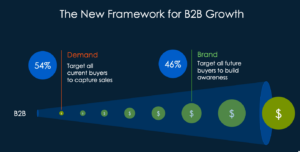
Institute of Practitioners of Advertising’s ratio recommendation for B2B marketers’ budget split
2. B2B Buyers Trust Brands That Feel Familiar
72% of B2B decision-makers prefer to engage with brands they’ve heard of before—even if another company offers the same solution.
Key Takeaway: If your brand is unknown, your demand gen efforts will struggle to convert, no matter how optimized they are.
3. Performance Marketing Alone Isn’t Enough Anymore
Paid ads, lead forms, and hyper-targeted outreach are great for short-term wins, but they don’t build the emotional connection needed for long-term pipeline growth.
The fix? Investing in a balanced strategy that includes:
- Thought leadership
- Brand storytelling
- Organic awareness tactics
What This Means for B2B Marketers
Performance Marketers Need to Think Like Brand Marketers
This doesn’t mean ditching demand gen, but it does mean integrating brand-building tactics into:
- SEO
- Content marketing
- Video strategy

- Paid media strategies
Instead of just tracking conversion metrics, companies should also measure:
- Brand recall
- Brand sentiment
- Share of voice
Marketing Leaders Should Rethink Budget Allocation
Expect to see a shift in B2B marketing budgets where at least 30-40% goes toward brand-building efforts, including:
- Social proof campaigns
- Community engagement
- Storytelling-driven marketing
Companies that ignore this trend risk getting lost in the noise—especially in crowded, commoditized markets.
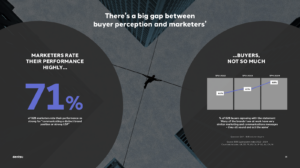
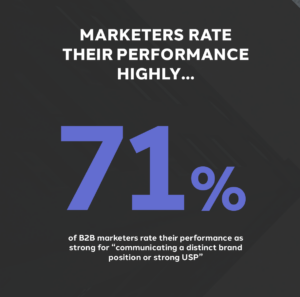
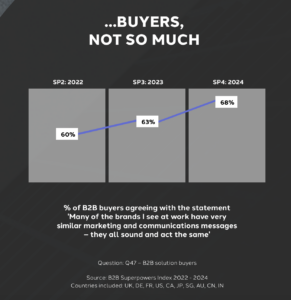
Brand Equity = An Unfair Competitive Advantage
Companies like HubSpot, Salesforce, and Gong have dominated their categories by blending performance marketing with strategic brand storytelling.
Key Takeaway: B2B marketers need to rethink how they show up in the market—not just what they sell but why buyers should trust them.
Final Thoughts
As B2B buyers behave more like B2C consumers, brands that prioritize trust, familiarity, and emotional connection will win the long game.
How is your marketing team balancing brand-building with performance? Let’s talk!



